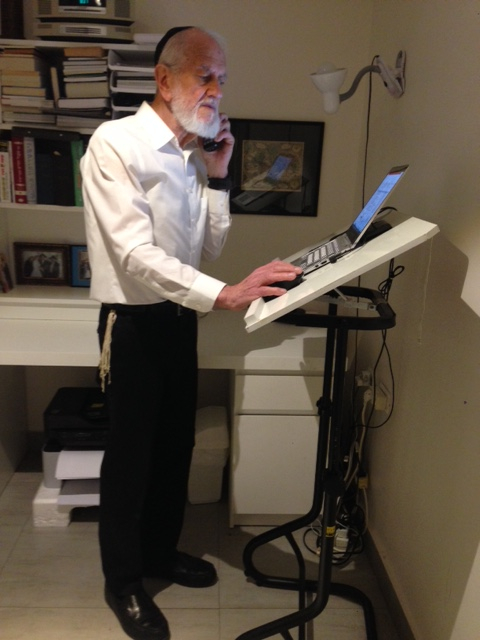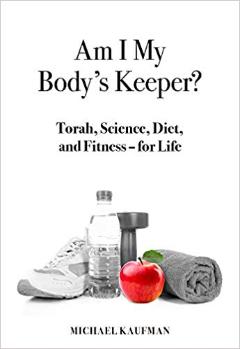 Iran’s Attack on Israel
Iran’s Attack on Israel


8 min read
You are your body’s keeper.
The Torah directives “And you shall take very good care of your bodies”1 and “You shall walk in His ways”2 are understood by many of the sages as charges to stay healthy and be physically fit.
Having a healthy and fit body is what God wants, Maimonides, the great 12th century rabbi, philosopher and physician declared. He ruled that “one is obliged to refrain from all things that impair the body and adopt those elements that strengthen it.”3
Rabbi Israel Meir Kagan, the19th-20th century sage known as the Chafetz Chaim, observed that it is a mitzvah to take care of your life and health. Indeed, he wrote, “The entire Torah is dependent upon the mitzvah of taking care of your body.”4
So, take a walk.
Attributed to John Wesley, the 18th century British theologian,5 the quotation accurately expresses the Jewish approach to cleanliness as taught some 1700 years ago in the Talmud6 in an array of directives regarding personal hygiene and public sanitation. Cleanliness is seen as a prerequisite to holiness and to physical fitness.7
Throughout history, Jews were often less susceptible than others to pandemics and plagues such as the Black Death because of their concern for cleanliness and hygiene.8 Their neighbors, for the most part, never bathed. 9 Bathing was thought to be dan-gerous. Even kings and queens rarely bathed. Queen Isabella, who initiated the Spanish Inquisition and sponsored Columbus’s voyages, was said to have boasted of having taken but two baths in her entire life, when she was born and when she got married.10 Queen Elizabeth I is reputed to having been a noteworthy exception, shocking everyone by saying that she bathed once a month, “whether I needed it or not.” 11
As late as 1837, when Queen Victoria ascended to the British throne, there was no bathroom in Buckingham Palace. 12 In 1857, when Mormon leader Brigham Young was advised that the community adopt the practice of bathing weekly, he famously replied that he “had tried it” but he could not endorse it, saying that “it was not for everybody.”13
On the other hand, during the Spanish Inquisition, a sure sign indicating to Inquisitors that a Converso, an involuntary Jewish convert to Christianity, was in fact a secretly practicing Jew, was frequent washing and an affinity for personal hygiene.14
Cleanliness is, for Jews, a religious duty. The Talmud relates that once as Hillel, the first century BCE sage, parted from his students he mentioned that he was leaving to perform a mitzvah. “What mitzvah?” they asked. “Bathing,” he replied. “And is that then a mitzvah!” they exclaimed. “Yes, it is,” Hillel replied. “If the statues of kings are washed and scrubbed clean, how much more so should we humans who were created in God’s image15 keep our bodies clean.”16
Maimonides taught that exercise is the supreme preventive medicine, but that “inactivity is as great a detriment to health as activity is a benefit.” He urged people to be physically active: “Vigorous exercise preserves the body . . . while inactivity and lack of exercise weakens the body.”17
On the other hand, Maimonides made clear, “Everyone who sits back secure in his self-confidence and does not exercise. . . even if he eats healthy foods, and even if he takes good medical care of himself, all of his days will be painful ones and he will be weakened.”18
 Michael Kaufman at his shtender-desk
Michael Kaufman at his shtender-desk
He concluded: “So long as one exercises and exerts himself vigorously . . . no illness will befall him and his physical powers will be strengthened.”19
Make working out integral to your daily routine, something you don’t think about, but just do.
Everyone knows the significance of daily exercise for physical fitness, but few do it. Why? Many rationalize by saying they are too busy and don’t have the time. However applying the popular expression, “When you want something done ask the busy person,” we know that when we do need to do something important we always find the time for it. Is life something important enough to find time for?
Here’s an idea: Don’t make exercising special; adopt it as a habit. Make working out integral to your daily routine, something you don’t think about, but just do – like working, eating, drinking, sleeping. It works.
“Shuckle,” Yiddish for shake, refers to the back-and-forth and side-to-side rocking motion traditional among Jews praying and studying Torah in order to increase concentration. Some believe that the practice was prompted by the passage in Psalms, “All my bones shall say ‘Who is like unto You’, O God.”20
Others agree with Simon Brainin of Vilna, who wrote in 1883 that the distinctive custom was instituted specifically to exercise the body during study and prayer.21
This would relate to the contemporary practice of non-formal exercise called NEAT, active movements of the body conducted in the ordinary course of normal, “non-exercise” activities during the day. A recent popular example would be use of the standing (or “shtender”) desk with a computer atop it.
There are (give or take) 100 trillion cells in an adult human being. Those cells must keep moving around the body. When they stop we’re dead. So, reduce sitting, stand instead. Substitute your legs for the car. Move it. Do the shuckle!
In Maimonides’ words, “The postponement of old age is indeed possible.”22 As for those who rationalize physical inactivity by asserting “I’ll go when my time is up,” theirs is considered an unJewish – even deadly – fatalism.
Judaism teaches that God determines one’s lifespan, but this is augmented by the actions and endeavors of the individual. The sages compare refraining from taking care of oneself to suicide,23 a grave transgression.24 One cannot claim protection of Divine providence as an excuse for not being healthy and fit.25
So, live years longer and avoid illness and physical and mental disabilities by not smoking. Maintaining a healthy weight. Eating healthily – mostly fresh fruits and vegetables. Eliminating from your diet harmful foods such as processed meats, added sugars, sugared soft drinks and junk food. Significantly reducing red meat and all processed foods and added sugars. Exercising every day and keeping physically active. Standing, moving about and walking whenever you can, and refraining from sitting as much as possible. This will keep your heart, your brain, your muscles and the rest of your body and its organs healthy and strong. For Life. Lechayim!
 Excerpted from Am I My Body’s Keeper? Torah, Science, Diet and Fitness – For Life by Michael Kaufman, a scientifically based, easy to use guide for everyone for diet and weight loss – and keeping weight down – and long-term good health, fitness and life extension.
Excerpted from Am I My Body’s Keeper? Torah, Science, Diet and Fitness – For Life by Michael Kaufman, a scientifically based, easy to use guide for everyone for diet and weight loss – and keeping weight down – and long-term good health, fitness and life extension.
1. Deut. 4:15.
2. Deut. 28:9.
3. Maimonides, Mishneh Torah, Hilchot De’ot 4:1.
4. Toldot HaChafetz Chayim, q. in Yechezkel Ishayek, Chayim Beriyim Kehalacha, (B’nai Brak, 2007), p. 29.
5. https://www.dictionary.com/browse/cleanliness-is-next-to-godliness.
6. See Babylonian Talmud, Avodah Zarah 11a, 20a,b;
7. See for example BT Berachot 4b, 40a; Taanit 11a, b; Shabbat 50b, 140b; Chulin 43a, 84a, 105a, b; Sotah 4b; Megillah 24b; Bava Mdtzia 24a; Sanhedrin 17b.
8. Anna Foa The Jews of Europe After the Black Death (Oakland: University of California Press, 2000), p. 146. Among the reasons given is the observance of the Jewish laws of hygiene and cleanliness, and also a lower incidence of alcoholism and venereal disease among Jews. Encyclopaedia Judaica (Jerusalem : Keter Publishing House) 1972, 8:1141.
9. See Katherine Ashenburg, The Dirt on Clean: An Unsanitized History (New York: North Point Press / Farrar, Straus and Giroux, 2007).
10. http://www.alldeaf.com/threads/queen-isabella-of-spain-gross.21667/.
11. The Dictionary of National Biography, q. in https://www.express.co.uk/life-style/top10facts/551988/Top-10-facts-about-Elizabeth-I.
12. Lawrence Wright, Clean and Decent (New York: Penguin Global) 2005, p. 138
13. John G. Turner, Brigham Young, Pioneer Prophet (Cambridge and London: Harvard University Press, 2012), p. 256.
14. David M. Gitlitz, Secrecy and Deceit: The Religion of the Crypto-Jews (Albuquerque: University of New Mexico Press, 1996), p. 90.
15. Genesis 9:6.
16. Midrash Rabbah, Leviticus 34:3.
17. Mishneh Torah, Hilchot De’ot 4:1.
18. Ibid. 4:15.
19. Ibid. 4:14
20. Psalms 35:10.
21. Simon Brainin, Orah Lachayim (Vilna: 1883), p. 126.
22. Fred Rosner MD and Suessman Muntner, MD, The Medical Aphorisms of Moses Maimonides (New York: Yeshiva University Press), 1971, Vol. 2, 17:36.
23. Mishneh Torah, Hilchot Rotzeach U’Shmirat Hanefesh 2:2-3.
24. Shulchan Aruch, Orach Chayim, Hilchot Aveilut 345.
25. BT Pesachim 64b; Tosefot, BT Ketubot 30a, Hakol Biyedey Shamayim.
